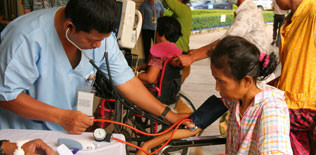Robib Telemedicine
Telemedicine involves the use of communications technology to move medical information rather than moving patients, so that anyone, anytime, anywhere can benefit from the best health care available. Throughout history, medical experts have tended to congregate in large metropolitan areas, limiting access of those who live in remote regions of the world. Telemedicine is becoming a powerful tool to bridge this inequality of access to quality medical care.
Since February 2001, Sihanouk Hospital Center of HOPE in Phnom Penh, Cambodia and Partners Telemedicine in Boston, Massachusetts, USA, have collaborated on telemedicine projects in Cambodia. Sihanouk Hospital Center of HOPE provides free care to Cambodians in need and is funded by HOPE Worldwide, an international charitable organization and Mr. Toshu Fukami, the chairman of World Mate, a Japanese non-profit welfare organization. Partners Telemedicine is a division of Partners HealthCare, a non-profit organization founded by Massachusetts General Hospital and Brigham and Women’s Hospital, both major teaching centers for Harvard Medical School. Since the mid 1990s, Partners Telemedicine has been using telemedicine to deliver medical care to patients in more than 30 countries.
Partners Telemedicine and Sihanouk Hospital Center of HOPE have named their collaborative program in Cambodia “Operation Village Health.” Operation Village Health opened the first Cambodian telemedicine clinic in Robib, a rural community in the district of Rovieng. In two and a half years, over two hundred patients have been treated for medical ailments ranging from acute abdominal pain to iodine deficiency and diabetes. A second telemedicine clinic was established at Ratanikiri Referal Hospital in April 2003 to expand access to Operation Village Health. In September, a “mobile internet village delivery system” utiliziung motorbikers to pick up and deliver e-mail by wireless technology to very remote villages was pioneered to 13 locations plus one health center in Ratanakiri, opening the prospect of ultimtely making telemedicine available to any forsaken location in the world
From this page, you can link to monthly reports from the telemedicine clinics and learn more about the medical knowledge we have been providing. The website was created and is maintained through the valiant efforts of our colleagues in Cambodia. Medical recommendations shown in these pages are tailored to each individual patient, and are not intended to be used as general medical advice.
The opportunity to work with colleagues and patients in Cambodia has been exciting and rewarding for the U.S.-based doctors collaborating on Operation Village Health. We are continually learning about Cambodian culture and the Cambodian approach to health care. Our goal is to improve access to health care and information on public health while strengthening the capacity of our Cambodian partners to address health care needs within the country. Many public health challenges exist in Cambodia and we believe we can use telemedicine to help address some of these.
Telemedicine can bring the expert knowledge and experience of specialists to any location in the world set up to receive information via telecommunications channels. Our vision is that a villager in rural Cambodia may be assured of getting the same medical care as a Bostonian at the Massachusetts General Hospital in the United States. While it takes time and learning to achieve this level of care, we believe our efforts in Cambodia are first steps in that direction for all villages of the world.
Joseph Charles Kvedar, MD
Corporate Director, Partners Telemedicine &
Associate Professor of Dermatology
Harvard Medical School
1 Longfellow Place, Suite 216
Boston, MA 02114
Tel: 617-726-4447, Fax: 617-726-7530
e-mail: jkvedar@telemedicine.partners.org
http://telemedicine.partners.org



